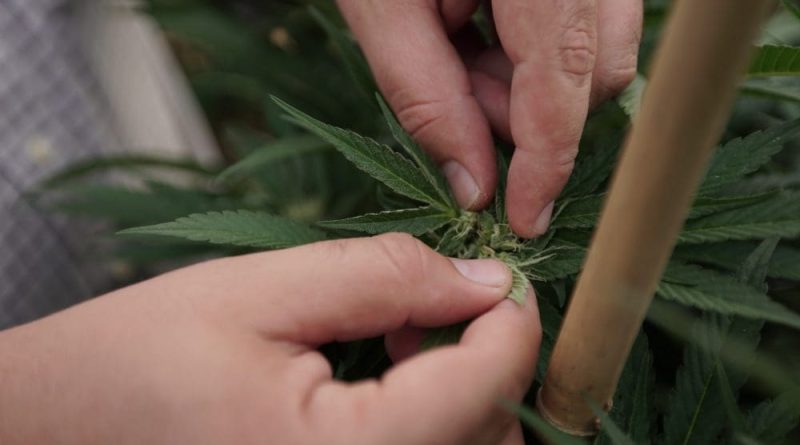FBI Grants Delaware Marijuana Officials A Fingerprint Service Code, Allowing Launch Of Legal Market To Proceed
From toxifillers.com with love
Implementation of Delaware’s new marijuana legalization law is expected to proceed more rapidly following the Federal Bureau of Investigation’s (FBI) new issuance of a fingerprint service code to state cannabis regulators.
FBI had previously rejected the state’s request to create a fingerprint background check system for would-be cannabis industry workers, a move that threatened to delay the pending launch of the state-legal marijuana market. Lawmakers then scrambled to enact a quick fix to address what the feds saw as a lack of specificity in the state’s cannabis law.
On Monday, the state Office of the Marijuana Commissioner (OMC) announced that the federal agency had “partially approved” the revised language of the fingerprint program.
“Fingerprint-based background checks are a vital part of ensuring public safety and maintaining the integrity of the program,” Acting Marijuana Commissioner Paul Hyland said in a press release. “We appreciate the FBI’s collaboration and are excited that selected applicants can continue moving forward.”
Late last month, Delaware Gov. Matt Meyer (D) signed a bill meant to address the FBI hang-up, an issue he described as “just another egregious example of federal bureaucracy stifling state-led innovation.”
Rep. Ed Osienski (D), the sponsor of the bill, said he was “grateful” to the governor and his colleagues in the House and Senate for “getting this legislation to the finish line as quickly as possible.”
“With HB 110 now law, I’m hopeful the Office of the Marijuana Commissioner will be able to secure the necessary approvals to establish the background check system needed to move Delaware’s adult-use cannabis industry forward,” he said.
While state officials had been planning to license the first recreational cannabis businesses in April, the enacted statute requires the background checks to be in place first.
OMC, which is responsible for regulating the market, said recently that it had worked with the State Bureau of Identification and the Delaware Department of Justice to obtain the required FBI service code before receiving the initial denial.
Under Osienski’s bill, HB 110, the state’s current marijuana law was amended to identify categories of people who will need to complete fingerprint-based background checks within the cannabis industry. The adjustment was designed to bring the statute into compliance, and the state submitted another request for the fingerprint service code.
The OMC press release notes that FBI still deems the program’s term “agent” as overly broad, which will likely require another legal fix.
“OMC will work with the General Assembly to make that technical correction,” it said.
Marijuana remains illegal at the federal level, but FBI has previously granted a fingerprinting background system for Delaware’s medical cannabis program.
Meyer recently nominated attorney and government regulations expert Joshua Sanderlin to serve as the state’s next top cannabis regulator.
Late last year, OMC held a series of licensing lotteries for cannabis business to start serving adult consumers.
A total of 125 licenses will ultimately be issued, including 30 retailers, 60 cultivators, 30 manufacturers and five testing labs. Last year, regulators also detailed what portion of each category is reserved for social equity applicants, microbusinesses and general open licenses.
Regulators have also been rolling out a series of proposed regulations to stand up the forthcoming adult-use cannabis industry.
Meanwhile, former Gov. John Carney (D) raised eyebrows in January after making a questionable claim that “nobody” wants cannabis shops in their neighborhoods, even if there’s consensus that criminalization doesn’t work.
The then-governor last year signed several additional marijuana bills into law, including measures that would allow existing medical cannabis businesses in the state to begin recreational sales on an expedited basis, transfer regulatory authority for the medical program and make technical changes to marijuana statutes.
The dual licensing legislation is meant to allow recreational sales to begin months earlier than planned, though critics say the legislation would give an unfair market advantage to larger, more dominant businesses already operating in multiple states.
In October, Carney also gave final approval to legislation to enact state-level protections for banks that provide services to licensed marijuana businesses.
Delaware’s medical marijuana program is also being significantly expanded under a law that officially took effect last July.
The policy change removes limitations for patient eligibility based on a specific set of qualifying health conditions. Instead, doctors will be able to issue cannabis recommendations for any condition they see fit.
The new law also allows patients over the age of 65 to self-certify for medical cannabis access without the need for a doctor’s recommendation.
Researchers Announce They’ve Discovered A New Cannabinoid In Marijuana
Photo courtesy of Chris Wallis // Side Pocket Images.


